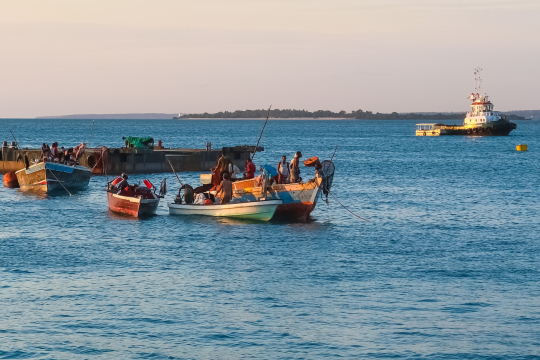Fisheries and aquaculture contribute to about 260 million jobs globally. But the oceans, lakes, and rivers are under severe pressure. Pollution, overfishing, and poor governance are serious threats to biodiversity and the livelihoods of millions. The collaborative program Blue Resources for Development, BlueRforD, aims at addressing those problems.
Aquaculture is the fastest-growing food production sector according to FAO (United Nations Food and Agriculture Organization). About 60 million people have their direct income from fisheries or aquaculture (according to FAO), and the sector supports 260 million if you also count the indirect jobs. Almost 40% of the global population lives within 100 km of the coast. And more than 90% of the trade between countries is through shipping.
Severe threats
Fisheries and aquaculture generate growth in many developing countries, provide high-quality protein at low cost for the domestic population, and in some cases generate large export revenues. The importance of the “blue resources” can hardly be overrated. At the same time, there are several environmental challenges linked to the rapid expansion of fisheries and aquaculture.
Developed assessment tool
The EfD centers have collaborated around blue resources for many years, but the BlueRforD collaborative program was established around 2020. One of the first projects within the program was to develop tools for assessing the performance of aquaculture. A team of researchers at the universities in Gothenburg, Sweden, and Gainsville, Florida developed a set of Aquaculture Performance Indicators (API) in collaboration with researchers from almost all of the EfD centers. The APIs were designed to be a rapid assessment instrument for measuring the performance of aquaculture production systems in the three key dimensions of sustainability: environmental, economic, and community. Researchers within BlueRforD initiated and completed data collection from 20 different aquaculture sectors around the globe.
Publishing papers
“We study factors for success, recurring obstacles for development, and how various environmental challenges can be handled to promote sustainability, explains Håkan Eggert, a researcher within BlueRforD.
“We are aiming at producing a series of articles on APIs to be completed during 2023. We are also studying the management of capture fisheries and we have initiated some projects on Marine Spatial Planning in the Global South,” he says.
Impact on policies
The strategic plan for the collaborative is closely linked to the SDG (Strategic Development Goal) 14, to conserve and sustainably use the oceans, seas, and marine resources for sustainable development.
Several researchers and projects within this collaborative have had a great impact on policies. For instance, the two policy awards at EfD’s Annual Meeting in Uganda that went to Ghana and Chile were related to work that has had a great impact on the fishing and aquaculture in those countries.
The collaborative’s plans for the nearest future involve producing papers on aquaculture as well as capacity-building activities for senior policymakers.
If you are interested in working in the BlueRforD collaborative program, contact:
Håkan Eggert: hakan.eggert@economics.gu.se or
Pham Khanh Nam, nam.pham@eepsea.net
By: Petra Hansson
